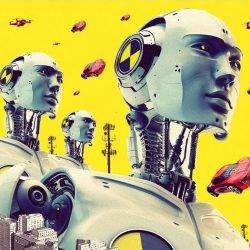November 29, 2018
2019 will be the year of the data-driven digital ecosystem, claims Dell
 Dell Technologies have shared their predictions for 2019. Its central forecast is that this will be the year of the data-driven digital ecosystem, bringing us one step closer to 2030, which Dell describes as the next era of human-machine partnerships and a society where we will be immersed in smart living, intelligent work, and a frictionless economy. This includes: The spark of the next gold rush in tech investments, spurred by the greater value to be derived from data; 5G paving the way for micro-hubs to line our streets, and the opportunity for real-time insights; Multi-cloud environments driving automation, AI and ML processing into high gear; Making room in the workforce for Gen Z; and stronger, smarter and greener supply chains
Dell Technologies have shared their predictions for 2019. Its central forecast is that this will be the year of the data-driven digital ecosystem, bringing us one step closer to 2030, which Dell describes as the next era of human-machine partnerships and a society where we will be immersed in smart living, intelligent work, and a frictionless economy. This includes: The spark of the next gold rush in tech investments, spurred by the greater value to be derived from data; 5G paving the way for micro-hubs to line our streets, and the opportunity for real-time insights; Multi-cloud environments driving automation, AI and ML processing into high gear; Making room in the workforce for Gen Z; and stronger, smarter and greener supply chains











 New research suggests as the supposed ‘technologically savvy’ millennials enter the workforce they are more likely than older workers to break the most basic of security rule, reusing passwords across different accounts. This is according to the results of the 10th Annual Market Pulse Survey from SailPoint Technologies Holdings, which finds that despite an increased focus on cybersecurity awareness in the workplace, employees’ poor cybersecurity habits are getting worse, which is compounded by the speed and complexity of the digital transformation.
New research suggests as the supposed ‘technologically savvy’ millennials enter the workforce they are more likely than older workers to break the most basic of security rule, reusing passwords across different accounts. This is according to the results of the 10th Annual Market Pulse Survey from SailPoint Technologies Holdings, which finds that despite an increased focus on cybersecurity awareness in the workplace, employees’ poor cybersecurity habits are getting worse, which is compounded by the speed and complexity of the digital transformation. 
 Over a quarter of businesses plan to hire temporary or contract staff in the next 12 months to help plug skills shortages created by digitalisation as more than half of CEOs are concerned about a lack of digital skills within their organisation. This is according to the Robert Half 2019 Salary Guide which argues that technology is reshaping businesses; with two in five UK organisations (38 percent) considering digitalisation as the main evolving force in the workplace today. This shift has created demand for a new set of skills, such as DevOps, data visualisation, data management and analytics. While softer skills such as resilience, adaptability and critical thinking remain key characteristics in potential employees, a third (31 percent) of employers state that a candidate’s technical skillset is their most important consideration when making a new hire. Around 1.6 million1 (28 percent) UK businesses plan to hire temporary or contract staff in the next twelve months, to combat the lack available talent required, which is creating a critical skills gaps in the workplace.
Over a quarter of businesses plan to hire temporary or contract staff in the next 12 months to help plug skills shortages created by digitalisation as more than half of CEOs are concerned about a lack of digital skills within their organisation. This is according to the Robert Half 2019 Salary Guide which argues that technology is reshaping businesses; with two in five UK organisations (38 percent) considering digitalisation as the main evolving force in the workplace today. This shift has created demand for a new set of skills, such as DevOps, data visualisation, data management and analytics. While softer skills such as resilience, adaptability and critical thinking remain key characteristics in potential employees, a third (31 percent) of employers state that a candidate’s technical skillset is their most important consideration when making a new hire. Around 1.6 million1 (28 percent) UK businesses plan to hire temporary or contract staff in the next twelve months, to combat the lack available talent required, which is creating a critical skills gaps in the workplace.




















November 13, 2018
Fostering creativity within organisations through space and culture
by Serena Borghero • Comment, Workplace design
(more…)